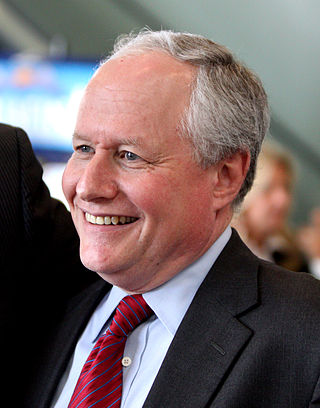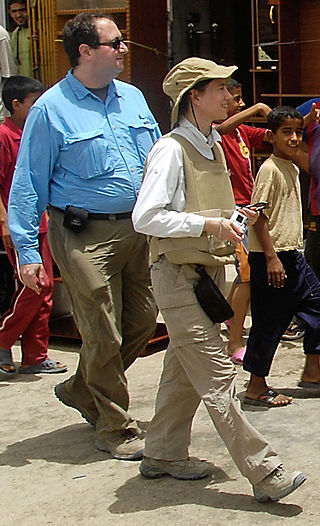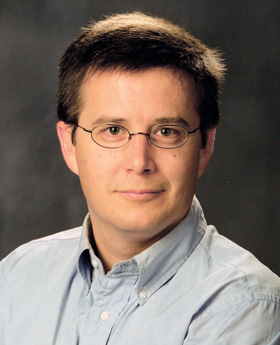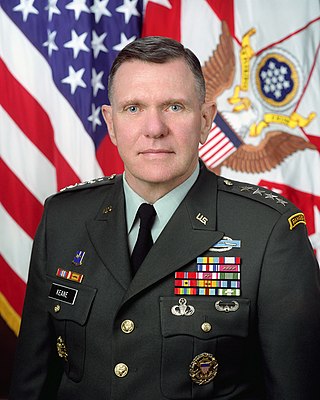Related Research Articles

The Bush Doctrine refers to multiple interrelated foreign policy principles of the 43rd President of the United States, George W. Bush. These principles include unilateralism, preemptive war, and regime change.
The Project for the New American Century (PNAC) was a neoconservative think tank based in Washington, D.C., that focused on United States foreign policy. It was established as a non-profit educational organization in 1997, and founded by William Kristol and Robert Kagan. PNAC's stated goal was "to promote American global leadership". The organization stated that "American leadership is good both for America and for the world", and sought to build support for "a Reaganite policy of military strength and moral clarity".

William Kristol is an American neoconservative writer. A frequent commentator on several networks including CNN, he was the founder and editor-at-large of the political magazine The Weekly Standard. Kristol is now editor-at-large of the center-right publication The Bulwark and has been the host of Conversations with Bill Kristol, an interview web program, since 2014.
Neoconservatism is a political movement which began in the United States during the 1960s among liberal hawks who became disenchanted with the increasingly pacifist Democratic Party along with the growing New Left and counterculture of the 1960s amidst the Vietnam War. Neoconservatives typically advocate the unilateral promotion of democracy and interventionism in international relations together with a militaristic and realist philosophy of "peace through strength". They are known for espousing opposition to communism and radical politics.

Edward Nicolae Luttwak is an American author known for his works on grand strategy, military strategy, geoeconomics, military history, and international relations. He is best known for being the author of Coup d'État: A Practical Handbook. His book Strategy: The Logic of War and Peace, also published in Chinese, Russian and ten other languages, is widely used at war colleges around the world. His books are currently published in 29 languages besides English.

The Center for Strategic and International Studies (CSIS) is an American think tank based in Washington, D.C. From its founding in 1962 until 1987, it was an affiliate of Georgetown University, initially named the Center for Strategic and International Studies of Georgetown University. The center conducts policy studies and strategic analyses of political, economic and security issues throughout the world, with a focus on issues concerning international relations, trade, technology, finance, energy and geostrategy.
A preventive war is an armed conflict "initiated in the belief that military conflict, while not imminent, is inevitable, and that to delay would involve greater risk." The party which is being attacked has a latent threat capability or it has shown that it intends to attack in the future, based on its past actions and posturing. A preventive war aims to forestall a shift in the balance of power by strategically attacking before the balance of power has had a chance to shift in the favor of the targeted party. Preventive war is distinct from preemptive strike, which is the first strike when an attack is imminent. Preventive uses of force "seek to stop another state. .. from developing a military capability before it becomes threatening or to hobble or destroy it thereafter, whereas [p]reemptive uses of force come against a backdrop of tactical intelligence or warning indicating imminent military action by an adversary."

Frederick W. Kagan is an American resident scholar at the American Enterprise Institute (AEI) and a former professor of military history at the U.S. Military Academy at West Point.

Ashton Baldwin Carter was an American government official and academic who served as the 25th United States secretary of defense from February 2015 to January 2017. He later served as director of the Belfer Center for Science & International Affairs at Harvard Kennedy School.

Peter Douglas Feaver is an American political scientist. He is currently a professor of political science and public policy at Duke University and a civil-military relations scholar.
Richard Kevin Betts is an American political scientist and international relations scholar who centers on U.S. foreign policy. He is the Leo A. Shifrin Professor of War and Peace Studies Emeritus in the Department of Political Science, former director of the International Security Policy Program in the School of International and Public Affairs at Columbia University, and former director of the Saltzman Institute of War and Peace Studies.

John M. "Jack" Keane is a former American general who served as vice chief of staff of the United States Army from 1999 to 2003. He is a national security analyst, primarily on Fox News, and serves as chairman of the Institute for the Study of War and as chairman of AM General.

Andrew Francis Krepinevich Jr. is a defense policy analyst who is a distinguished senior fellow at the Center for Strategic and Budgetary Assessments.
Clark Murdock is a senior adviser at Center for Strategic and International Studies (CSIS), a Washington, D.C.-based foreign policy think tank. Murdock specializes in strategic planning, defense policy, and national security affairs. He also serves as the Director of the Project on Nuclear Issues, a collection of nuclear experts from government, academia, the national laboratories, the military, and the private sector.

Kori N. Schake is an American international relations scholar currently serving as the Director of Foreign and Defense Policy at the American Enterprise Institute. She has held several high positions in the U.S. Defense and State Departments and on the National Security Council. She was a foreign-policy adviser to the McCain-Palin 2008 presidential campaign. Schake is a contributing writer at The Atlantic. She serves on the board of advisors of the Foreign Policy Research Institute and the Alexander Hamilton Society. Schake is a member of the Defense Policy Board Advisory Committee.

William C. Martel was a scholar who specialized in studying the leadership and policymaking processes in organizations, strategic planning, cyberwarfare and militarisation of space, and technology innovation. He taught at the U.S. Air War College and U.S. Naval War College, and performed research for DARPA and the RAND Corporation. He later become Associate Professor of International Security Studies at the Fletcher School of Law and Diplomacy, a position he held until his death in 2015.
Dr. William H. Overholt is a senior research fellow at John F. Kennedy School of Government's Mossavar-Rahmani Center for Business and Government at Harvard University and principal of AsiaStrat LLC, a consulting firm.
The Fletcher School's International Security Studies Program is a center for the study of international security studies and security policy development. It was established in 1971 at The Fletcher School of Law and Diplomacy, Tufts University. ISSP conducts its academic activity through courses, simulations, conferences, and research. It also has a military fellows program for midcareer U.S. officers.

Matthew Kroenig is an American political scientist and national security strategist currently serving as vice president of the Atlantic Council and professor in the Department of Government and the Edmund A. Walsh School of Foreign Service at Georgetown University. Kroenig is known for his research on international security and nuclear weapons.
Paul Young Hammond was an American foreign policy and security studies scholar. He was Distinguished Service Professor at the University of Pittsburgh Graduate School of Public and International Affairs from 1983 on; before that he was the Edward R. Weidlein Professor of environmental and public policy studies beginning in 1976 at the University of Pittsburgh. Before that he was senior social scientist at the RAND Corporation from 1964–76, including being head of the social science department and also being program director for strategic studies and Asian studies during 1973-76. His career earlier saw stints at the Washington Center of Foreign Policy Research at Johns Hopkins University, Yale University, Columbia University, and the United States Naval Academy among other places. Hammond also often worked as a consultant to various departments of the United States Government.
References
- 1 2 "Rosen is First Kaneb Professor". Archived from the original on 2007-08-16. Retrieved 2007-06-27.
- ↑ Kristol, William (September 20, 2001). "Bush letter". Project for the New American Century. Archived from the original on October 18, 2013. Retrieved January 10, 2023.
- ↑ Rebuilding America's Defenses: Strategies, Forces and Resources for a New Century Archived September 23, 2002, at the Wayback Machine , Project for the New American Century, September 2000, accessed May 14, 2007.
- ↑ "Rudy Giuliani Announces Foreign Policy Team Members". JoinRudy2008.com. 2007-07-09. Archived from the original on 2007-12-03. Retrieved 2007-11-15.
- ↑ "Giuliani names 3 more Jews as advisers". Jewish Telegraphic Agency jta.org. 2007-10-12. Archived from the original on 2007-11-14. Retrieved 2007-11-15.
- ↑ "Stephen Rosen on Conversations with Bill Kristol".
- ↑ "Stephen Rosen Transcript - Conversations with Bill Kristol".
- ↑ "Stephen P. Rosen | AMERICA ABROAD MEDIA". Archived from the original on 2013-01-25. Retrieved 2014-06-16.